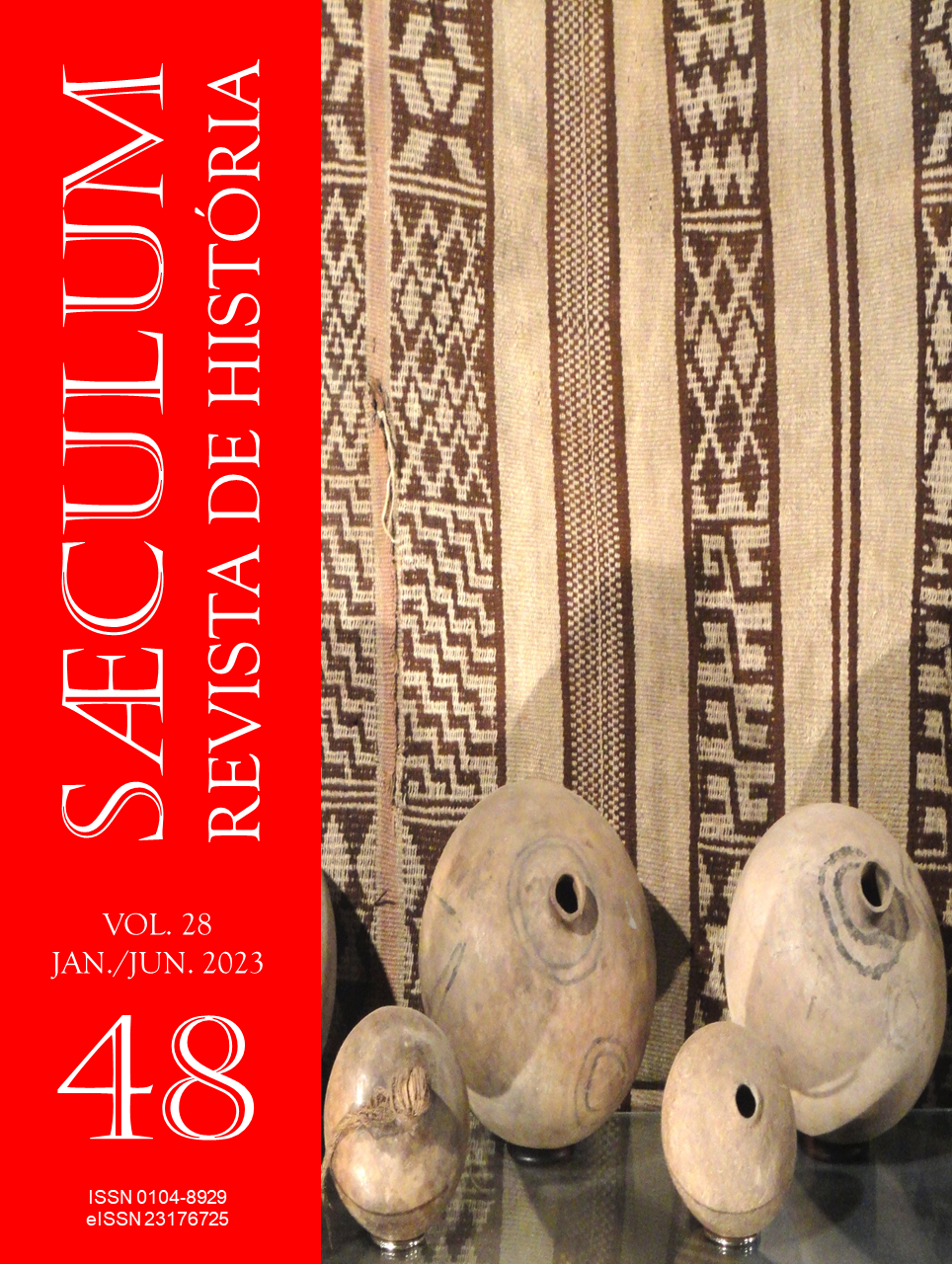The indigenous issue present in History textbooks
an analysis based on the guidelines of the digital guide to public textbooks of the Brazilian government
DOI:
https://doi.org/10.22478/ufpb.2317-6725.2023v28n48.65983Keywords:
History Teaching, Guide to public textbooks of the Brazilian 2020, History and Culture of Indigenous people in Brazil, Brazilian law 11.645/08Abstract
This is paper aims to provide a thorough analysis based on the observations presented in the Digital Guide PNLD 2020 (Brazilian Public System for the Purchase and Distribution of Educational Books), specifically concerning the eleven approved collections for use in the final grades of Elementary Education in Brazil. Our objective is to highlight how the experts responsible for selecting these collections emphasize the theme of Indigenous History and Culture. Furthermore, we will examine how these collections address this theme, investigating whether there is an emphasis on Indigenous presence in historical periods beyond the colonial era, and whether they go beyond the exoticized view often associated with these societies. Particularly, we seek to identify whether the analyzed collections go beyond the obligations established by Law 11.645/08, which mandates the compulsory inclusion of content related to Indigenous History and Culture in the school curriculum. Delving into this analysis of the Digital Guide PNLD 2020 is crucial, as this document plays a pivotal role in the decision-making process of educators in the Brazilian public basic education system when selecting instructional materials. The Digital Guide PNLD 2020 was chosen as the focus of this research due to its often underestimated relevance and impact on the instructional materials selection process. We believe that by bringing forth the insights and evaluations contained in this guide, we can contribute to a more comprehensive understanding of the approach to Indigenous History and Culture in the selected educational collections, as well as underscore the guide's significance in the context of public basic education. Therefore, through this in-depth analysis, we aim to shed light on how the approved collections for the final grades of Elementary Education address and explore the richness of Indigenous History and Culture, with the aim of enhancing the educational experience of students.
Downloads
References
ALMEIDA, Maria Regina Celestino de. Identidades étnicas e culturais: novas perspectivas para a história indígena. In: ABREU, Martha & SOIHET, Rachel (orgs.). Ensino de história: conceitos, temáticas e metodologia. 2. ed. Rio de Janeiro: Casa da Palavra, 2009, p. 27-38.
APPLE, Michael W. Trabalho docente e textos. Porto Alegre: Artes Médicas, 1995.
ARROYO, Miguel. Currículo, território em disputa. Petrópolis: Vozes, 2011.
BITTENCOURT, Circe. O saber histórico na sala de aula. São Paulo: Contexto, 2004.
BRASIL. 2020. Guia de livros didáticos: PNLD 2020: História: Ensino Médio. Brasília, Ministério da Educação, Secretaria de Educação Básica, 156 p. Disponível em: https://pnld.nees.ufal.br/assets-pnld/guias/Guia_pnld_2020_pnld2020-historia.pdf, acesso em 26 de março de 2021.
CAIMI, Flávia Eloisa. A História na Base Nacional Comum Curricular: pluralismo de ideias ou guerra de narrativas? Revista do Lhiste-Laboratório de Ensino de História e Educação, Porto Alegre, vol. 3, n. 4, p. 86-92, 2016.
CASSIANO, Célia Cristina de Figueiredo. O mercado do livro didático no Brasil: do Programa Nacional do Livro Didático–PNLD à entrada do capital internacional espanhol (1985-2007). Tese (Doutorado em Educação). São Paulo: Pontifícia Universidade Católica de São Paulo, 2007.
FELIPE, Delton Aparecido; TERUYA, Teresa Kazuko. O “outro” na sala de aula: o cinema no ensino da história e cultura afro-brasileira na educação escolar. Revista Contrapontos, Itajaí, vol. 10, n. 1, p. 82-89, 2010.
FOUCAULT, Michel. Microfísica do poder. Organização e tradução de Roberto Machado. Rio de Janeiro: Edições Graal, 1979.
GANDRA, Edgar Ávila; NOBRE, Felipe Nunes. A temática indígena no ensino de História do Brasil: uma análise da coleção didática Projeto Araribá (2008-2013). Revista do Lhiste-Laboratório de Ensino de História e Educação, Porto Alegre, vol. 1, n. 1, p. 40-57, 2014.
GRUPIONI, L. D. B. Livros didáticos e informações sobre as sociedades indígenas no Brasil” In: LOPES DA SILVA & GRUPIONI (orgs.). A Temática Indígena na Escola. Brasília: MEC/MARI/Unesco, 1995, 560 p.
MIRANDA, Sonia Regina; LUCA, Tânia Regina de. O livro didático de história hoje: Um panorama a partir do PNLD. Revista Brasileira de História, São Paulo, vol. 24, n. 48, p. 123-144, 2004.
MOTA, Lúcio Tadeu; NOVAK, Éder da Silva. Os Kaingang do Vale do Ivaí – PR: História e relações interculturais. Maringá: EDUEM, 2008
MOTA, Lúcio Tadeu; RODRIGUES, Isabel Cristina. A questão indígena no livro didático “Toda História”. História & Ensino, Londrina, vol. 5, p. 41-59, 1999.
MUNAKATA, Kazumi. Produzindo livros didáticos e paradidáticos. Tese (Doutorado em Educação). São Paulo: Pontifícia Universidade Católica de São Paulo, 1997.
OLIVEIRA, Sandra Regina Ferreira de; RAMOS, Marcia Elisa Tete; CAINELLI, Marlene Rosa. As sociedades indígenas nos livros didáticos de história: entre avanços, lacunas e desafios. Revista História Hoje, São Paulo, vol. 7, n. 14, p. 63-85, 2018.
PEREIRA, Nilton Mullet; RODRIGUES, Mara Cristina de Matos. BNCC e o passado prático: temporalidades e produção de identidades no ensino de história. Archivos analiticos de politicas educativas, Florida, EPAA, vol. 26, n. 107, p. 01-19, 2018.
RODRIGUES JUNIOR, Osvaldo. Manuais de didática da história no Brasil (1997-2013): entre tensões e intenções. Tese (Doutorado em Educação). Curitiba: Universidade Federal do Paraná, 2015.
SANTOS, Boaventura de Sousa. Para uma sociologia das ausências e uma sociologia das emergências. Revista Crítica de Ciências Sociais, Coimbra, n. 63, p. 237-280, 2002.
SILVA, Jeferson Rodrigo da. De anônimo a best-seller: digressões sobre o sucesso do Projeto Araribá-História no PNLD de 2008. Revista Tempo e Argumento, Florianópolis, vol. 4, n. 2, p. 102-127, 2012.
SILVA, Simone Maria; BORGES, Claudia Cristina do Lago. Educação escolar indígena potiguara: uma análise estrutural e material. Tellus, Campo Grande, n. 38, p. 341-367, 2019.
TADEU, Tomaz. Documentos de identidade: uma introdução às teorias do currículo. São Paulo: Autêntica, 2016.
WITTMANN, Luisa Tombini. Ensino (d)e história indígena. São Paulo: Autêntica, 2015.
Downloads
Published
How to Cite
Issue
Section
License
Copyright (c) 2023 Arnaldo Martin Szlachta Junior, Wilian Junior Bonete

This work is licensed under a Creative Commons Attribution-NonCommercial 4.0 International License.
A revista Sæculum permite aos autores a manutenção dos direitos autorais pelo seu trabalho, no entanto eles devem repassar direitos de primeira publicação ao periódico.











